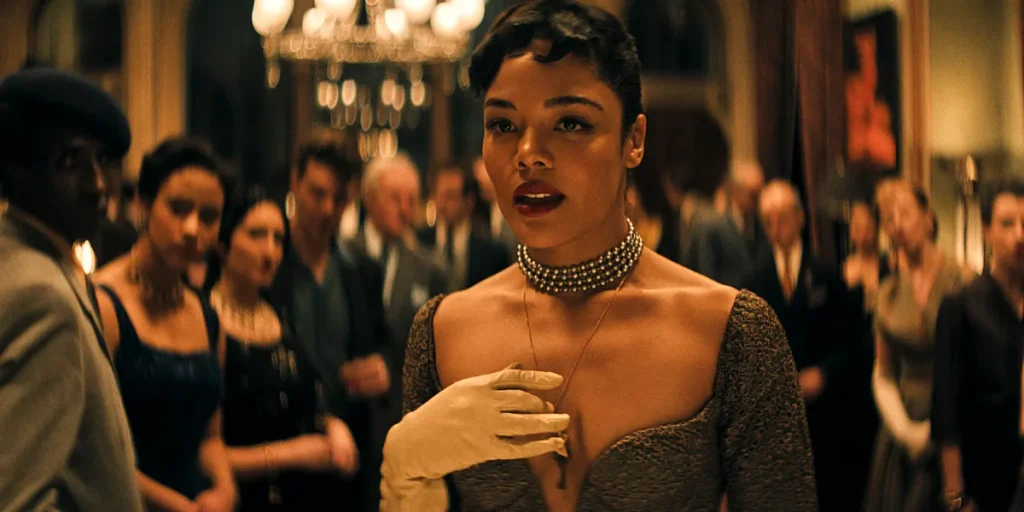Nia DaCosta’s Hedda is a witty, humorous, and incredibly tense mystery with a sensational ensemble cast.
Director: Nia DaCosta
Genre: Drama, Romance
Run Time: 107′
Rated: R
BFI London Film Festival Screening: October 12-13, 2025
Global Release Date: October 29, 2025
Where to Watch it: Stream it globally on Prime Video
Based on the 1891 play “Hedda Gabler” by Henrik Ibsen, Hedda starts during a lavish party hosted by a newlywed couple, Hedda Gabler (Tessa Thompson), the daughter of a general, and George Tesman (Tom Bateman), her husband. As they welcome their friends and family into their new home, the mansion they live in becomes the playground for a series of secrets and hidden motives between all the characters involved, including Judge Roland Brack (Nicholas Pinnock), one of Hedda’s former suitors, and Thea Clifton (Imogen Poots), whose relationship with the main character has been tumultuous in the past.
With this retelling set in mid-century England, director Nia DaCosta offers a feminist perspective of the original play that focuses as much on Hedda’s desires and the power struggle in the newlywed couple as it does on the mystery and secrets that are key to this story. Much like the play it is based on, Hedda takes place over the course of one evening and exclusively in one location: Hedda and George’s lavish home. While the latter does have a significant number of rooms, it is very fascinating to see a movie that keeps its setting so tightly focused on one location. As the characters move through the house, the audience also begins to learn its ins and outs, almost finding our way through it ourselves. The acting is another strong element of the movie, with a very impressive ensemble cast; Tessa Thompson and Imogen Poots particularly stand out for their layered and emotional portrayal of their respective characters.
From the very beginning of Hedda, the film builds tension really well. The audience is immediately keen to find out more about Hedda, the people that surround her, and what really happened on the night of the dinner party. The conflict between the characters is also very well delivered in both the scriptwriting and acting. Each character has hidden motivations, secrets they don’t want revealed, and complicated relationships with the other players for the film, making for a fascinating and layered movie that builds its tension and mystery with each scene. With quite a few important characters, the film also does a really good job at giving the audience a clear idea of who they are without revealing too much from their very first introduction.
The film borrows a lot from the world of theatre, to the point where it begs the question of whether it’s even worth making an adaptation at all, if so much of it remains reliant on the original theatre version. The further exploration of feminist themes would prompt us to say yes, but in terms of technical elements and performances, Hedda remains faithful to aspects that are traditionally associated with theatre rather than filmmaking. Tessa Thompson’s acting is especially theatrical in terms of physicality and energy. While this could have potentially worked on its own, it clashes with the overall tone of the film and the other performances that tend to be more cinematic, focusing on facial expressions and smaller movements.
The stage inspiration is immediately visible in its script writing, too. Most of Hedda is made up of powerful dialogues and monologues that reveal the characters’ relationships with each other, their motivations, and their past. All of this is delivered primarily through the writing rather than using other cinematic tools, such as flashbacks, to name one. This does not allow the movie to explore the characters’ backstories as much as I would have liked. This leaves the audience wanting more in this regard, as exploring their background would have allowed us to understand the characters’ motivations and actions even more. Admittedly, with a script as strong as this one and such a talented cast, it still works incredibly well in the movie.
Overall, Hedda is a fantastic film with strong performances and a witty script that is, at the same time, funny, heartbreaking, and tense. With a strong female voice behind it, Nia DaCosta’s film stands out for its exploration of feminist themes and a clever reworking of the original play that adapts the story for modern audiences. Led by a wonderful Tessa Thompson, the ensemble cast delivers a compelling character-driven mystery that will keep audiences on the edge of their seat until the very last scene.
Hedda (2025): Movie Plot & Recap
Synopsis:
Over the course of one evening, secrets and tensions between the guests come out as Hedda hosts a party in her house with all of her and her husband’s friends.
Pros:
- The feminist retelling modernises the play for today’s audiences.
- The film builds the tension and central conflict really well.
Cons:
- Some elements of the production and performances heavily borrow from the world of theatre.
Hedda will be screened at the BFI London Film Festival on 12-13 October, 2025.

